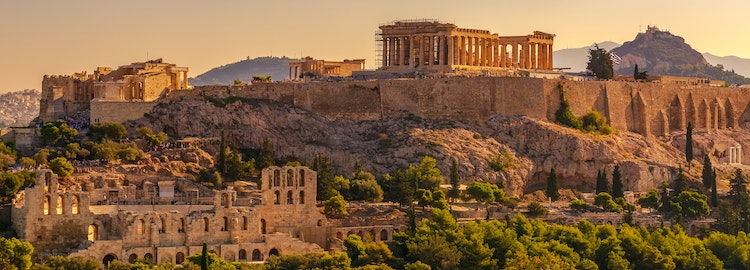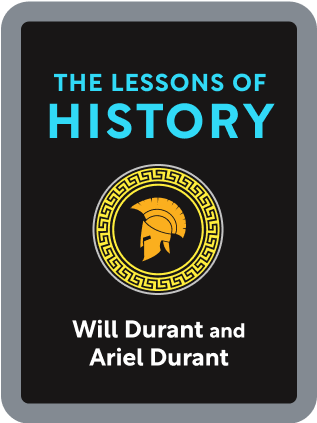

This article is an excerpt from the Shortform book guide to "The Lessons of History" by Will Durant and Ariel Durant. Shortform has the world's best summaries and analyses of books you should be reading.
Like this article? Sign up for a free trial here .
Are revolutions justified? How do tyrannies rise? What lessons can we learn about government in history?
In The Lessons of History, Will and Ariel Durant provide an overview of government in history. They examine Plato’s “five regimes” and show how this model played out in Greece and Rome. They also comment on revolutions, democracy, and tyranny—through the historical lens.
Read more to learn about the government in history.
Perspectives on Government in History
Durant believes that the first requirement of freedom is its own limitation: absolute freedom would cause chaos and the extinction of freedom itself. For the sake of stability, order needs to be established, and that is the role of an organized central government.
The Natural Progression of Government
In his idea of “five regimes,” Plato saw a natural progression of government from monarchy to aristocracy to democracy to tyranny:
- Monarchy is possibly the most natural form of government, descending from the father of the family or the chieftain of a tribe from earlier human societies. However since succession is often hereditary, leaders become prone to incompetence, laziness, and excess. A saner alternative is more distributed responsibility, like:
- Aristocracy, where the elite hold power and train their offspring to rise to governance. This provides meaningful stability in morals and culture. But like monarchy, aristocracy is prone to corruption and hedonism. Hence the masses (stirred partly by rich, non-aristocratic merchants who feel constrained) overthrow the aristocracy, leading to:
- Democracy, with greater individual liberty than all the other forms. There is greater freedom, and morals weaken, the customs of old are washed away. Wealth inequality intensifies as a consequence of unequal concentration of inability. If uncontrolled, the civil strife between the rich and poor erupts, and opens an opportunity for:
- Tyranny, where an authoritarian leader promises to solve the problems.
We can see this progression of government in history, specifically in Greece:
- Beginning with aristocracy in Pericles (460-430BC). With the defeat in the Peloponnesian War, the demos or lower class rose to power.
- Civil strife between oligarchs and democrats led to assassinations. Plato condemned the violence, moral decadence, and love of money stirred by democracy.
- The gap between rich and poor widened. The rich flaunted their wealth, the poor schemed to redistribute through legislation, taxation, and sometimes murder of creditors and the rich. The rich in turn entrenched against the poor.
- The rich distrusted democracy as “empowered envy,” and the poor distrusted it as a farce, with putative equality of voting obscuring the underlying inequality of wealth.
- This bitterness left Greece divided when Philip of Macedon conquered in 338 BC, leading many to welcome his coming as preferable to revolution.
We can see this progression of government in history also in Rome:
- 300-200 BC: The Roman oligarchy with army conquered the Mediterranean. Conquered peoples were brought to Italy as slaves. Native farmers joined the proletariat in cities. The General returned with spoils.
- By 50 BC: Money replaced land as political power, rival factions purchased candidates and votes. Citizens who voted the wrong way were sometimes killed. Government became corrupt.
- Aristocrats engaged Pompey to maintain power; commoners sided with Caesar, who won and established dictatorship. He was killed by aristocrats, but Augustus came and became a dictator.
Does History Justify Revolutions?
The authors believe that the effects achieved could be had through gradual development instead of violent upheaval, which risks the loss of sanity around breaking continuity.
As we look at government in history, we see that revolutions try to redistribute wealth. But, because wealth is the means of production rather than goods, the natural inequality of man soon recreates inequality. “The only real revolution is in the enlightenment of the mind and the improvement of character.”
Evaluation of Democracy
Much of historical “democracy” does not deserve the title, not giving true equal access to opportunity for all.
America had better initial conditions, with the precedence of the Magna Carta, defending citizens against the state, and of Protestantism, which gave religious liberty. It eased rebellion with ample free land and minimal legislation. It was also mostly protected from foreign powers by seas.
Modern democracies are more successful in redistributing wealth to give such access to education and public health. Man does not have rights to wealth and power, but rather the rights to access to opportunities that can develop and test a person’s fitness for wealth and power.
Yet the authors claim that true democracy, or rule by the majority, is unnatural. The majority can rarely organize themselves for united action, but a minority can. If abilities are naturally concentrated in a minority of people, then government by a minority is as inevitable as wealth inequality.
Rise of Tyranny
Opportunities can open for a tyrant to rise. Example situations include when a government loses interest in the well-being of citizens; workers become more resentful of losing economic freedom; inequality intensifies; civil strife continues; substantial outside threat materializes. In these cases, a tyrant can appear, promising opportunity and security for all.
The Durants’ examination of government in history reveals patterns that help us understand the evolving relationship between governments and people.

———End of Preview———
Like what you just read? Read the rest of the world's best book summary and analysis of Will Durant and Ariel Durant's "The Lessons of History" at Shortform .
Here's what you'll find in our full The Lessons of History summary :
- What we can learn from studying 5,000 years of history
- How human nature hasn’t changed over thousands of years
- Why all civilizations, including ours, fall, and why we shouldn’t cry about it





